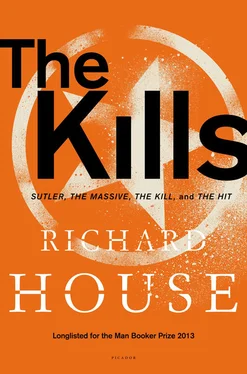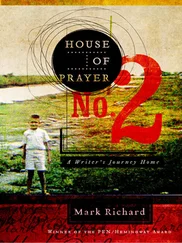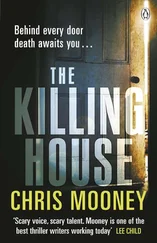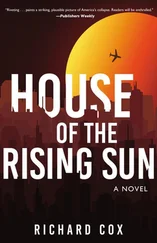‘No. But they were in two envelopes. Separate. Now they are together. Someone has been looking through his papers, because they are in a completely different order. Photos of the train. Photos of the body. They were in sealed envelopes. They were opened and mixed together.’
Although this has nothing to do with her, Rike still feels responsible.
5.5
At the Banco di Napoli Gibson draws out the maximum three hundred euro from his personal account. He tries his other cards, debit and credit, struggles to remember the numbers, and is pleased to be able to draw out, in total, a further nine hundred euro. He tries his business cards, but has to go into the bank as these cards are refused. Here they tell him that the sum he wishes to withdraw would take ten days to transfer.
Twelve hundred euro is as much as he can muster.
He stuffs the money into his inside jacket pocket, then returns to the entrance to Hotel Sette.
The passageway leads to a courtyard, then a larger staircase and a caged elevator. The steps are long and sloped, easy to ascend. At the third floor the signs for the hotel with arrows indicating the front of the building are hand-printed and curl from the walls.
The woman behind the counter wears large glasses and appears startled. She doesn’t speak English, and when Gibson talks to her she blinks.
‘There is a man,’ he says, ‘who stayed here. In this room.’ Gibson points to the room beside reception. ‘This one. At the front.’
The woman blinks at him.
‘English?’ he asks. ‘Inglese? Parla Inglese? Trova un persona che parla Inglese?’
This doesn’t help. It isn’t even schoolboy Italian. ‘I need to speak with someone. It is important.’
A man comes out from an office. A simple beaded curtain divides the rooms. A beaded curtain. A man in a string vest with thick slicked-back hair. So familiar it’s a little laughable.
The man politely asks if he can help.
‘I need information about one of your guests.’
The man folds his arms. ‘What is the name?’
‘The man was staying in this room. I think he was staying in this room. I know that it was this hotel.’
The man says he can’t help unless Gibson has a name and tells him what he needs.
Gibson gives the woman a cautious glance and lowers his voice. ‘It’s a little delicate. ’ And here he takes out the money. ‘I need to give him this. I need an address.’
The man, now confused, looks hard at the money.
Gibson leans forward and lowers voice a little more. ‘I have a daughter. You understand. A daughter who is interested in this man.’
The man looks from the money to Gibson with equal incredulity. ‘I wish to give him something so that he will leave my daughter alone. You understand?’ Gibson allows his finger to divide the money in half. ‘I need some information, I need his name and I need an address. I want to make sure he isn’t coming back.’ He begins to wish he’d kept with the original idea, that his daughter had disappeared.
The man shakes his head. There wasn’t anyone here, not in this room, within the last month, and not with any woman.
‘My daughter is fifteen years old.’ Gibson sets half of the money on the counter. He keeps his voice flat and cold. ‘Fifteen. Do you see the problem? She is fifteen. I need a name and an address. I know you keep these details. He left eight days ago.’
The man steps back behind the counter and speaks quickly to the woman as he searches through a drawer. She looks up, swipes the man’s hands away then searches through the drawer herself and brings out a register. She places the register on the counter, over the money.
6.1
Rike suggests that they take a walk. If they follow the street it will lead them to the bay. There are the wine factories on one side and the town on the other, the road is the dividing line between a light industrial zone and a living quarter. Today they will walk and talk.
Tomas, naturally, isn’t keen. And while he doesn’t refuse, he asks if this is a good idea. It’s hard to think out there: the sun, the noise, the distraction.
No books, she insists. No notebooks, no prepared speeches, no pocket dictionaries. ‘We shall speak today about what we find in front of us. Today you will demonstrate a mix of tenses, you aren’t to worry about your vocabulary, you aren’t to worry about being perfectly correct. Today you are to walk with me and speak about things you have not prepared.’
Tomas’s reaction is stern. He’d much rather not, if she didn’t mind.
‘Believe me, you’ll find out that you know more than you realize. It won’t be so hard. I’ll help you.’
Tomas nods, and searches in his pockets for his keys.
In the stairwell, as he locks the door and tests to make sure it is shut, he asks about the museum. Did she go? Did she see that piece. The artists are German?
‘They are here, you know,’ he says in English. ‘The artists are in Limassol, and they’re making new work for the internet. I heard them interviewed on BFPS.’ He has a flyer, he says, something he picked up when he left the museum. He hasn’t yet checked to see what this work is, but now that he’s seen one piece by them — and here he falters a little — in fact participated in the piece, he’s curious to see other works. Not that he really understands them. But he’s curious.
Rike admits she’s also curious. Having participated in the piece it would be interesting to see what else they’ve done. Yes, she’s curious.
‘And you did take part?’ he asks.
‘I did.’
‘You recorded something?’
‘I did.’
‘Can I ask what it was?’
Rike comes down the stairs ahead of Tomas. ‘It’s a little complicated. I chose a date, but I didn’t save it because it isn’t my story. My sister lost a child before he was born.’ Even now, the bluntness of the fact hurts. Something so horribly complex, so easily described. ‘I left the date and name, but chose not to save it.’
She walks ahead to avoid his reaction, and is relieved when he doesn’t respond. It takes a great effort not to explain further, to allow the fact to sit.
‘And now,’ he asks, ‘you said she is going to have another child?’
They are further along already, Rike explains, and doctors, Henning, everyone, are prepared this time, and yes, everything is going very well. She is too superstitious to say more.
‘And your brother, he comes here as well?’
This, Rike explains, is a whole other issue. ‘When I first lived in London I lived with my brother and his partner. A man called Franco.’ For three months Rike lived with her brother and witnessed what she can only call wilful cruelty. ‘He’s a bully. He knows how to get inside people.’ This is the simple fact. ‘The trouble is, Franco couldn’t see it. He just let it happen, and it was like watching someone fall, who doesn’t put out their hands or make an attempt to save themselves.’ And here is the complication. The more hopeless Franco appeared, the more the situation mattered to her.
Tomas is quiet. For a moment she thinks that she is over-explaining herself.
They come to the entrance, stand side by side. It is an infinite relief when Tomas simply nods.
‘He’s here. In Cyprus, and I just don’t want to be involved. I don’t want to be part of it.’ The words embarrass her, but the facts are plain. ‘Right now. I would be happy if he just disappeared.’
Читать дальше












